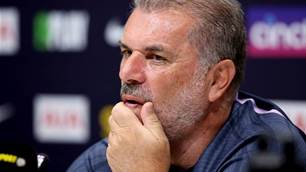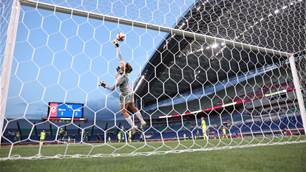It was not the epic anticipated, but what it revealed about both clubs was significant.
It was not the epic that so many had anticipated, but it was a match that nevertheless was significant, not just in terms of the title race, but in what it revealed about both clubs.
For Manchester United, it exposed their increasingly fragile and lacklustre midfield, Sir Alex’s growing conservatism and revealed the enormity of the task facing Manchester United in overcoming what is probably their biggest, most direct challenge to complete domestic domination.
Sir Alex has been accused of papering over the cracks over the last few seasons since the big money departure of Cristiano Ronaldo and the loss of Carlos Tevez, with particular criticism directed at his midfield. These criticisms have perhaps been overstated; after all, these are the same players for the most part that have helped United to four out of the last five Premier League titles, a Champions League win, two other Champions League finals, and a host of Carling Cup and Club World Cup victories. Today though, they have found new voice, and seem much more valid. If Sir Alex has squeezed every bit of use out of the likes of Paul Scholes, Ryan Giggs and Park Ji-Sung, then surely the rag is going to be bone dry soon enough, if it isn’t already.
Of United’s seven central midfielders, those being Michael Carrick, Paul Scholes, Darren Fletcher, Ryan Giggs, Anderson, Tom Cleverley and Park Ji-Sung, only Michael Carrick seems capable of contributing real quality for the full season. Paul Scholes has been a revelation since returning, but if he was to be relied upon once more to the same extent next season, it would be a massive indictment on the management of Manchester United. Park seems past his “use-by” date, Giggs can contribute only in bits and pieces, Anderson can’t overcome his injury problems, Fletcher is chronically ill and Tom Cleverley, for all his promise and early season brilliance, clearly hasn’t adapted to the rigours of a full season in the Premier League just yet.
That is a rather shambolic state of affairs for a club that every year tops the charts for, “most profitable football club”. When the vast majority of those profits are eaten up by interest repayments, instead of quality footballers, you can begin to understand Sir Alex’s conservatism in the market.
This is of course juxtaposed by United’s oil-rich neighbours Manchester City, who have had the fortune of having owners who actually invest in the club, instead of sucking money from it. While Manchester United perseveres with aging talent, and the odd gem from the academy, Manchester City has built a formidable squad, almost exclusively through the transfer market. Yaya Toure, David Silva, Gareth Barry and Samir Nasri proved a far more formidable and imposing force in the middle of the park than the meek offering served up by Michael Carrick, once more the best of a poor lot, Park Ji-Sung, Ryan Giggs and Paul Scholes.
Criticisms of Manchester City’s rise as hollow are essentially as shallow as what they accuse Manchester City of being. No club in the modern era has achieved success without a significant outlay on players. Chelsea before City, and Blackburn before them, spent millions before they could claim a Premier League crown. United benefited from a world class crop of youngsters, but they didn’t prolong such success without breaking the British transfer record numerous times on the likes of Andy Cole, Rio Ferdinand and Dimitar Berbatov.
It has taken over £500 million just to get in a position to win it, but that will be of little concern to the City fans who have endured so much over the years, particularly at the hands of their crosstown neighbours. Such a victory would be monumental for the club and ought to give credence to talk of a power shift in Manchester, though the extent of the truth in that can only be judged in a few years time to avoid the embarrassment of being proven wrong once more by Sir Alex Ferguson and his side.
What makes City such a dangerous prospect to their competitors though is not simply the money that they can spend, it is the culture of stability that has been formed at the club under Mansour’s rule. This is the fundamental difference between Manchester City and Roman Abramovic’s Chelsea, and why City could be on the brink of unparalleled dominance in English football, whether they end up winning the league title this season or not.
Mourinho’s Chelsea outfit were formidable, and if Abramovic had the foresight not to let petty disagreements get in the way of what could have been a legacy to challenge Sir Alex’s own, Chelsea would be a major, major force in the English game today, perhaps even bigger than their Mancunian counterparts are today.
Mancini is not in the same league as Mourinho in terms of his football management abilities, and he has made a lot of mistakes, but the difference here is that Mancini has been empowered by the trust placed in him by City’s owners. The Mansours do not go out and buy players while no permanent manager is installed, they don’t tell Mancini who to play, and when Mancini makes mistakes, they simply let him learn from them.
These are invaluable traits that make Manchester City a far more formidable outfit, and hold them in far better stead in the long term than the erratic ownership model of Abramovich, or the debt ridden model of the Glazers. As long as that money is behind City, and that stability is provided, Manchester City could be, or rather will be, the force of the next decade in English and perhaps world football.
It’s not a power shift yet, but it’s certainly the beginning of a very significant one.
Related Articles

Postecoglou looking to A-League to 'develop young talent'
.jpeg&h=172&w=306&c=1&s=1)
Big change set to give Socceroos star new lease on life in the EPL













